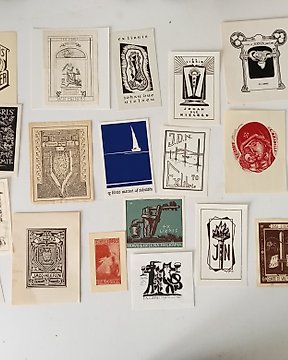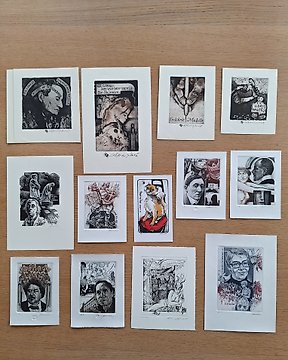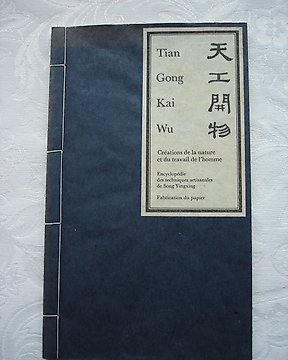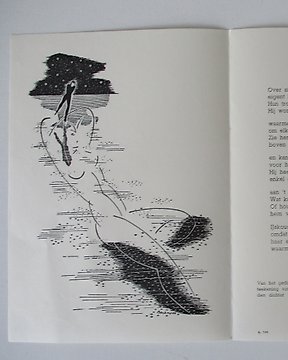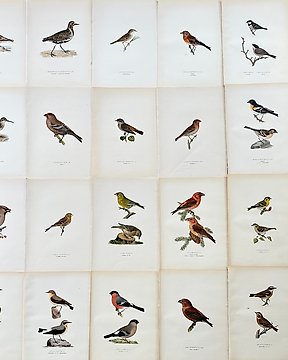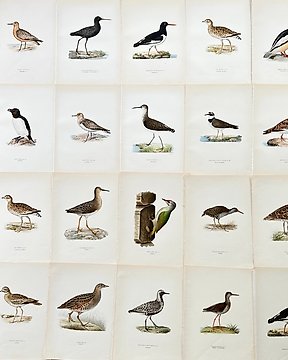Great Seller! Accurate item description! Packaging could be better, especially for these expensive objects.
Ver traducciónOscar Wilde - The Annotated Oscar Wilde - 1982
N.º 85225625



"The Annotated Oscar Wilde" by Oscar Wilde and annotations by H. Montgomery Hyde - BCA - 1982 first thus UK edition - 25cmx18cm - condition: very good, original green binding, complete with all illustrations
Oscar Fingal O'Fflahertie Wills Wilde[a] (16 October 1854 – 30 November 1900) was an Irish poet and playwright. After writing in different forms throughout the 1880s, he became one of the most popular playwrights in London in the early 1890s. He is best remembered for his epigrams and plays, his novel The Picture of Dorian Gray, and his criminal conviction for gross indecency for homosexual acts.
Wilde's parents were Anglo-Irish intellectuals in Dublin. In his youth, Wilde learned to speak fluent French and German. At university, he read Greats; he demonstrated himself to be an exceptional classicist, first at Trinity College Dublin, then at Magdalen College, Oxford. He became associated with the emerging philosophy of aestheticism, led by two of his tutors, Walter Pater and John Ruskin. After university, Wilde moved to London into fashionable cultural and social circles.
He tried his hand at various literary activities: he wrote a play, published a book of poems, lectured in the United States and Canada on the new "English Renaissance in Art" and interior decoration, and then returned to London where he lectured on his American travels and wrote reviews for various periodicals. Known for his biting wit, flamboyant dress and glittering conversational skill, Wilde became one of the best-known personalities of his day. At the turn of the 1890s, he refined his ideas about the supremacy of art in a series of dialogues and essays, and incorporated themes of decadence, duplicity, and beauty into what would be his only novel, The Picture of Dorian Gray (1890). Wilde returned to the drama, writing Salome (1891) in French while in Paris, but it was refused a licence for England due to an absolute prohibition on the portrayal of Biblical subjects on the English stage. Undiscouraged, Wilde produced four society comedies in the early 1890s, which made him one of the most successful playwrights of late-Victorian London.
At the height of his fame and success, while An Ideal Husband (1895) and The Importance of Being Earnest (1895) were still being performed in London, Wilde issued a civil writ against John Sholto Douglas, the 9th Marquess of Queensberry for criminal libel.[3] The Marquess was the father of Wilde's lover, Lord Alfred Douglas. The libel hearings unearthed evidence that caused Wilde to drop his charges and led to his own arrest and criminal prosecution for gross indecency with men.[4] The jury was unable to reach a verdict and so a retrial was ordered. In the second trial Wilde was convicted and sentenced to two years' hard labour, the maximum penalty, and was jailed from 1895 to 1897.[5] During his last year in prison he wrote De Profundis (published posthumously in abridged form in 1905), a long letter that discusses his spiritual journey through his trials and is a dark counterpoint to his earlier philosophy of pleasure. On the day of his release, he caught the overnight steamer to France, never to return to Britain or Ireland. In France and Italy, he wrote his last work, The Ballad of Reading Gaol (1898), a long poem commemorating the harsh rhythms of prison life.
"The Annotated Oscar Wilde" by Oscar Wilde and annotations by H. Montgomery Hyde - BCA - 1982 first thus UK edition - 25cmx18cm - condition: very good, original green binding, complete with all illustrations
Oscar Fingal O'Fflahertie Wills Wilde[a] (16 October 1854 – 30 November 1900) was an Irish poet and playwright. After writing in different forms throughout the 1880s, he became one of the most popular playwrights in London in the early 1890s. He is best remembered for his epigrams and plays, his novel The Picture of Dorian Gray, and his criminal conviction for gross indecency for homosexual acts.
Wilde's parents were Anglo-Irish intellectuals in Dublin. In his youth, Wilde learned to speak fluent French and German. At university, he read Greats; he demonstrated himself to be an exceptional classicist, first at Trinity College Dublin, then at Magdalen College, Oxford. He became associated with the emerging philosophy of aestheticism, led by two of his tutors, Walter Pater and John Ruskin. After university, Wilde moved to London into fashionable cultural and social circles.
He tried his hand at various literary activities: he wrote a play, published a book of poems, lectured in the United States and Canada on the new "English Renaissance in Art" and interior decoration, and then returned to London where he lectured on his American travels and wrote reviews for various periodicals. Known for his biting wit, flamboyant dress and glittering conversational skill, Wilde became one of the best-known personalities of his day. At the turn of the 1890s, he refined his ideas about the supremacy of art in a series of dialogues and essays, and incorporated themes of decadence, duplicity, and beauty into what would be his only novel, The Picture of Dorian Gray (1890). Wilde returned to the drama, writing Salome (1891) in French while in Paris, but it was refused a licence for England due to an absolute prohibition on the portrayal of Biblical subjects on the English stage. Undiscouraged, Wilde produced four society comedies in the early 1890s, which made him one of the most successful playwrights of late-Victorian London.
At the height of his fame and success, while An Ideal Husband (1895) and The Importance of Being Earnest (1895) were still being performed in London, Wilde issued a civil writ against John Sholto Douglas, the 9th Marquess of Queensberry for criminal libel.[3] The Marquess was the father of Wilde's lover, Lord Alfred Douglas. The libel hearings unearthed evidence that caused Wilde to drop his charges and led to his own arrest and criminal prosecution for gross indecency with men.[4] The jury was unable to reach a verdict and so a retrial was ordered. In the second trial Wilde was convicted and sentenced to two years' hard labour, the maximum penalty, and was jailed from 1895 to 1897.[5] During his last year in prison he wrote De Profundis (published posthumously in abridged form in 1905), a long letter that discusses his spiritual journey through his trials and is a dark counterpoint to his earlier philosophy of pleasure. On the day of his release, he caught the overnight steamer to France, never to return to Britain or Ireland. In France and Italy, he wrote his last work, The Ballad of Reading Gaol (1898), a long poem commemorating the harsh rhythms of prison life.
- 609
- 37
- 19
Uitstekend over de gehele lijn: aanbevolen verkoper!
Ver traducciónVery beautiful books.
Ver traducciónBoeken in goede orde ontvangen, dank. Er waren wat problemen met de verzending en dan blijkt dat het contact met de verkoper nogal moeizaam verloopt.
Ver traducciónAll good.
Ver traducciónprima, alles precies zoals verwacht. top.
Ver traducciónSpedizione a dar poco lenta, penso che avrebbe fatto più presto a viaggiare con una carrozza a cavalli. Spese di spedizione eccessive, pagati separatamente due oggetti arrivati nello stesso pacco
Ver traducciónSpedizione a dar poco lenta, penso che avrebbe fatto più presto a viaggiare con una carrozza a cavalli. Spese di spedizione eccessive, pagati separatamente due oggetti arrivati nello stesso pacco
Ver traduccióntutto ok
Ver traducciónTrès bien merci
Ver traducciónBoek volgens beschrijving, levering liet iets op zich wachten, was iets verkeerd gegaan bij de post.
Ver traducciónBoekje is goed
Ver traducciónBeste Mayflower, ik ben zeer tevreden over het Caldecott-album als over de wijze van fairtrade
Ver traducciónexcelent pack of books and good delivery!
Ver traducciónBijzonder blij, bijzonder mooi boekwerk. Stevig verpakt en snel geleverd. Thanks !
Ver traducciónSlechts 1 boek ontvangen. Deze 3 boeken nooit ontvangen! Verkoper antwoord niet op berichten. Na eerdere negatieve ervaringen met deze verkoper is mijn conclusie koop niet bij deze verkoper!
Ver traducciónIk ben deze week weggeweest. Ik heb u net een bericht gestuurd dat een onderzoek met postnl opgestart zal worden voor dit pakket; en u kan vervangende boeken krijgen of een refund.
Boek is in orde maar ruim 2 weken op verzending moeten wachten.
Ver traducciónEverything fine – the envelope was a bit torn, but the bubble wrap protected the book well. Thanks.
Ver traducciónEstá en buenas condiciones a. pesar de haber sido usado un largo tiempo . Gracias
Ver traducciónTodo correcto. Muchas gracias
Ver traducciónPoor packaging as always. A padded bag is not suitable for heavy books posted abroad. Book sustained damage to corners,
Ver traducciónNice book thanks!
Ver traducciónBeautiful books as described. Perfect delivery. Many thanks!
Ver traducciónsuper tevreden. Boek was zeer goed ingepakt. Bedankt.
Ver traducciónFast delivery and well-packaged (luckily, because the courier just slammed it through the mailslot). Always happy buying from this seller!
Ver traducción- 609
- 37
- 19
Great Seller! Accurate item description! Packaging could be better, especially for these expensive objects.
Ver traducción